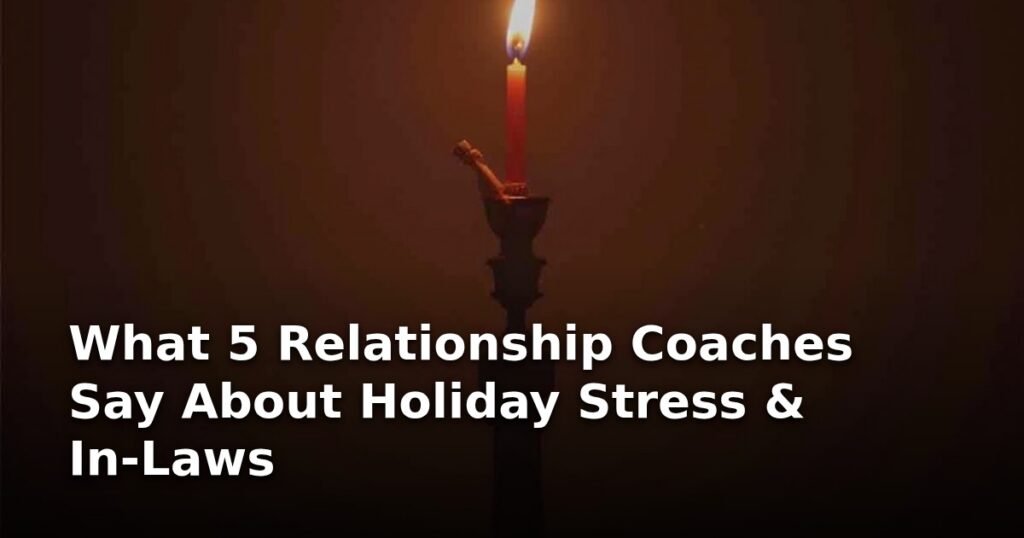What 5 Relationship Coaches Say About Holiday Stress & In-Laws
The holiday season, often depicted as a time of warmth and togetherness, frequently introduces significant relational friction. From navigating complex family dynamics to managing packed schedules, stress levels soar, testing even the strongest partnerships. Understanding how to apply holiday relationship advice proactively is crucial for maintaining harmony. To provide readers with robust, actionable strategies, we consulted five seasoned relationship coaches specializing in couples counseling, family integration, and stress management. Their collective wisdom offers a comprehensive guide to weathering the festive storm and setting a positive tone for the coming year.
The Experts Weigh In: Diverse Perspectives on Holiday Harmony
Our panel includes coaches with diverse specializations, ensuring a well-rounded view of modern relationship challenges. We have experts focusing on communication dynamics, boundary setting with extended family, and maintaining marital connection amidst external pressures. Their insights are grounded in years of clinical practice, making their advice both credible and highly practical.
Expert 1: Dr. Eleanor Vance – Specialist in Conflict Resolution
Dr. Vance emphasizes that holiday tension often stems from unmet expectations regarding time and tradition.
Key Insight: Pre-emptive Boundary Negotiation is Non-Negotiable.
Dr. Vance argues that vague agreements lead to resentment. Couples must treat holiday planning like a major business negotiation, clearly outlining "must-do" versus "nice-to-have" events. This is especially critical when managing in-law relationship stress.
Supporting Explanation: If one partner expects a three-day visit from their parents while the other anticipated a quiet weekend, conflict is inevitable. Dr. Vance suggests using a "Three Whys" approach: Why is this event important to you? Why is the timing crucial? Why are you willing to compromise?
Actionable Takeaway: Schedule a dedicated, calm "Holiday Logistics Meeting" before December 1st. Write down agreed-upon visit lengths, travel plans, and designated "couple-only" time slots, and hold each other accountable respectfully.
Expert 2: Marcus Chen, LMFT – Focus on Marital Connection

Marcus Chen sees the holidays as a crucible for effective communication in marriage because the stakes—and the proximity—are so high.
Key Insight: Prioritize Micro-Moments of Connection Over Grand Gestures.
When juggling hosting duties and social obligations, couples often default to transactional communication ("Did you call the caterer?"). Chen stresses the importance of maintaining emotional intimacy through brief, intentional check-ins.
Supporting Explanation: Stress shrinks attention spans. A quick, genuine connection—a 60-second hug without talking about logistics, or a shared glance across a crowded room—reaffirms partnership before external pressures divide focus. This is vital, particularly when staying connected during stressful work periods overlaps with family duties.
Actionable Takeaway: Implement a "Daily 10-Minute Decompression." Every night, sit down without phones and share only one positive thing and one genuine stressor from the day. Listen without trying to solve the problem immediately.
Expert 3: Sarah Jenkins – Expert in Extended Family Dynamics
Sarah Jenkins specializes in helping couples integrate spouses into pre-existing family structures, a common source of managing in-law relationship stress.
Key Insight: Your Spouse is Your Primary Team; Your Family is Secondary.
Jenkins asserts that when an in-law criticizes a partner, the other partner’s immediate, unified defense is paramount to long-term marital health. Loyalty must be visibly demonstrated.
Supporting Explanation: Many people fall into old family roles during the holidays, causing their spouse to feel like an outsider or a subordinate. If your mother criticizes your husband's career choice, your response must be, "Mom, we have discussed this, and we are happy with our decision," not, "Honey, maybe you should explain yourself better."
Actionable Takeaway: Create a "Code Word" system for uncomfortable family situations. If one partner uses the code word, the other immediately steps in to diffuse the tension or steers the conversation elsewhere, no questions asked until later in private.
Expert 4: David O’Connell – Coach for High-Achieving Couples

David O’Connell notes that professional demands often peak alongside holiday demands, creating burnout that spills into relationships. His advice is crucial for those staying connected during stressful work periods.
Key Insight: Schedule White Space for Nothing.
Burnout isn't just about being busy; it’s about a lack of recovery time. O’Connell advises couples to actively schedule periods where no obligations—personal, professional, or familial—are allowed to intrude.
Supporting Explanation: For couples accustomed to optimizing every minute, "free time" often gets filled with chores or work catch-up. White space is intentional emptiness designed for spontaneous reconnection or necessary rest. This buffer prevents low frustration tolerance when dealing with minor holiday annoyances.
Actionable Takeaway: Block out three non-negotiable, four-hour segments between now and New Year’s Day labeled "Unscheduled Connection Time." Honor these blocks as seriously as a board meeting.
Expert 5: Dr. Lena Hayes – Specialist in Post-Holiday Renewal
Dr. Hayes focuses on leveraging the end of the year for relational growth, offering valuable dating advice for the new year by analyzing the preceding holidays.
Key Insight: The Debrief is More Important Than the Event.
Too often, couples collapse exhausted after the last guest leaves, missing a critical opportunity for learning. The way you process the holidays informs your success moving forward.
Supporting Explanation: If you spent the entire holiday feeling unheard (a failure in effective communication in marriage), the underlying issue won't fix itself by January 1st. A structured review helps turn stress into strategy.
Actionable Takeaway: On January 2nd, conduct a "Relationship Report Card." Rate the holiday on key areas (e.g., boundaries, fun, stress level) and identify one thing you will stop doing next year and one thing you will start doing.

Common Themes and Synthesized Best Practices
Reviewing these five expert perspectives reveals several overlapping themes essential for successful holiday navigation and improving overall holiday relationship advice:
- Proactive Planning Over Reactive Management: Nearly every expert emphasized the necessity of making decisions before the stressor arrives (boundaries, logistics, code words).
- The Primacy of the Partnership: When external pressures mount (in-laws, work), the couple must present a unified front, prioritizing their bond above pleasing others.
- Intentionality in Connection: Moments of true connection must be scheduled and protected, as they will not happen organically amidst chaos.
Synthesized Recommendations for a Stronger Season
Based on these insights, we can distill a powerful, actionable framework:
- The Boundary Blueprint: Clearly define limits regarding time, spending, and in-law involvement. Ensure both partners verbally agree on how to enforce these limits together.
- Communication Checkpoints: Establish daily, brief, non-logistical check-ins to maintain emotional intimacy, especially when staying connected during stressful work periods.
- The Post-Mortem Review: Schedule time in early January to constructively analyze what worked and what didn't, directly feeding into better dating advice for the new year by solidifying positive habits.
Conclusion: An Action Plan for Lasting Connection
The holidays present unique challenges, but they also offer unparalleled opportunities to deepen your partnership through shared navigation of difficulty. By implementing these expert strategies—focusing on clear communication, unwavering mutual support when managing in-law relationship stress, and intentional connection—you can move beyond merely surviving the season to actively thriving within it.
Your action plan for the immediate future involves three steps: First, schedule your Holiday Logistics Meeting this week. Second, commit to the Daily 10-Minute Decompression. Third, select your Code Word with your spouse. Addressing these areas now ensures that the foundation of effective communication in marriage remains strong, regardless of how many relatives show up on your doorstep.



